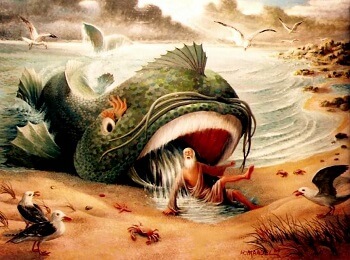 The first reading for Mass talks about two allegories and in the gospel today, Jesus talks about a sign. In both instances, the allegories and the sign was simple on the surface, but they were much more complicated in their meaning. That sounds like modern life, doesn’t it? Nothing is ever as simple as it seems at first glance. Our Catholic faith is like that too. Our Catholic faith is like an onion. It is so simple that children can understand it, or it is so complex that theologians, and the greatest thinkers of the Catholic church throughout history have dedicated their lives to examining our faith in great depth. Saint Thomas Aquinas and Saint Augustine are the first two that come to mind.
The first reading for Mass talks about two allegories and in the gospel today, Jesus talks about a sign. In both instances, the allegories and the sign was simple on the surface, but they were much more complicated in their meaning. That sounds like modern life, doesn’t it? Nothing is ever as simple as it seems at first glance. Our Catholic faith is like that too. Our Catholic faith is like an onion. It is so simple that children can understand it, or it is so complex that theologians, and the greatest thinkers of the Catholic church throughout history have dedicated their lives to examining our faith in great depth. Saint Thomas Aquinas and Saint Augustine are the first two that come to mind.
Back to the subject of the readings for mass though …
The first reading is very beautiful because it talks about Sarah becoming a mother after being barren all her life. God vindicated her. To be barren in her time was considered a curse. Sarah was barren and advanced in years, and yet she became the mother of nations. This just goes to show you that God can and does, turn hopeless situations into unimaginable joy. This happened to Sarah, even in spite of the fact that she doubted what the angels told Abraham.
But, the first reading is telling us about the two allegories. One religion was born of a slave (Hagar) and one was born from a freeborn woman (Sarah). This is still a bone of contention in the world. The Muslim faith sprang from Hagar and the Jewish and Christian faith came from Sarah. They shared the same father though, Abraham. All three religions still share a common belief in the same Father. Why can’t we focus on what we have in common, more than the differences in our beliefs? Our differences are profound, but so is our faith in God the Father.
Where the Jewish, Muslim and Christian faith diverge from one another though, is what the scriptures explain to us in the readings for Mass today. We believe that Sarah fulfilled what was foretold of her in the scriptures:
“Rejoice, you barren one who bore no children; break forth and shout, you who were not in labor; for more numerous are the children of the deserted one than of her who has a husband.” ~ Isaiah 54:1
Then, in the gospel today, Jesus mentions that his life would reflect that of Jonah’s, but the people did not understand it at the time. Jesus was explaining to the crowd the symbolism of his own death. The sign they asked for would be his own death. He actually told them ahead of time that it would happen, so that later when it did happen, his disciples and others present that day would remember that he said that.
The reason the story of Jonah is a foreshadowing of Jesus’s death, by the way, is because Jonah was in the belly of a whale for three days, and was by all human expectations, dead. Jesus was buried in the earth for three days, and was also considered to be dead. However, Jesus, like Jonah was released from the throes of death and lived.
Jesus praised the “queen of the south” who came from the ends of the earth to hear the wisdom of King Solomon, because she demonstrated a great act of faith and belief in God. And yet, the people of his generation (the Jews) had no faith or belief in him.
Both of the readings for Mass could be simply summed up as the need to have faith in something you can not yet see, but believe in. God is real. Jesus Christ really is God’s son. Jesus died for the forgiveness of our sins. If we have repented of our sins, Christ forgives us and invites us to live with him and His Father forever, in heaven. Death has no hold over us. We have to believe that, even though we can not see through to the other side of eternal life.
God has been faithful to mankind for thousands of years, and He really does have a plan for the many generations that have lived upon the earth, but also for each one of us. We are called to believe Him, to trust Him, and to have faith in the Lord Jesus, for he has conquered death once and for all.
Daily Mass Readings:
Galatians 4: 22-24, 26-27, 31-5:1 / Psalm 113 / Luke 11: 29-32
